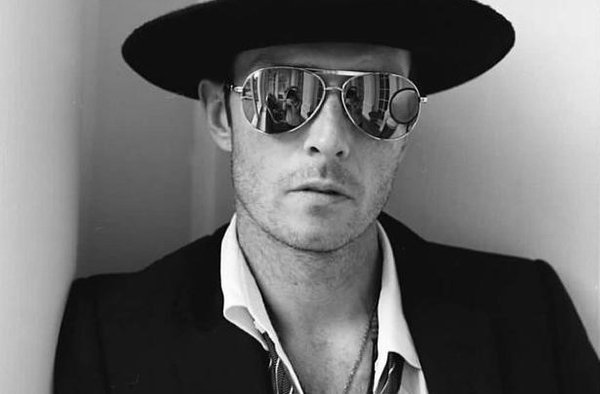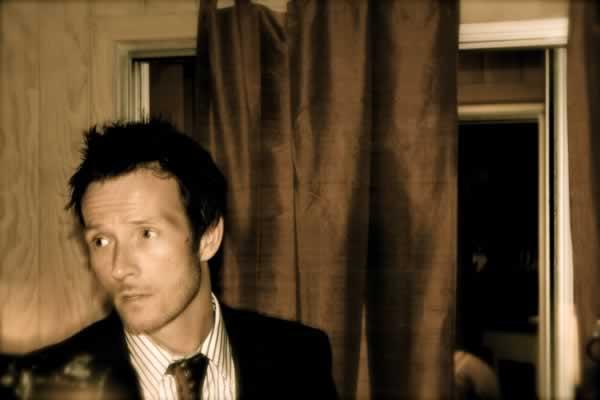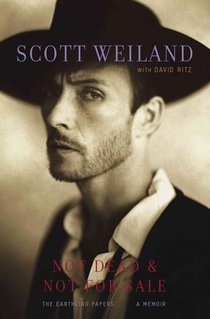Kirkus Reviews, founded in 1933, is a venerable institution in the media world, serving as the industry bible for bookstore buyers, librarians, and ordinary readers alike for more than 75 years. As part of the Kirkus Book Bloggers Network, a rotating crew of your favorite Popdose writers will grace the virtual pages of Kirkus Reviews Online, taking on the best — and sometimes the worst — in pop-culture and celebrity books. From coffee-table studies to quickie unauthorized bios, if it’s about show biz, it’s fair game.
Okay, now that that’s out of the way, let’s talk about this week’s offering.
Somewhere amongst the vast expanses of alternate universes, there is a plane of existence where Popdose has, in and of itself, the pop culture power to pull an interview with Scott Weiland, but I don’t think there’s anyone on our dedicated staff of writers who isn’t willing to admit that this conversation likely would not have taken place if we had not had the name and reputation of Kirkus Reviews behind us.
With that said, however, I’m going to go out on a limb and add that it also never would have taken place if I hadn’t had the emotional fortitude to stand strong and stick with my desire to talk to Mr. Weiland despite the number of false starts that went down during the process of trying to nail down the date and time of our conversation.
When I got an advance copy of Weiland’s memoir, Not Dead & Not for Sale, and realized that I’d have enough time to read it prior to Stone Temple Pilots’ appearance at the NorVa, in Norfolk, VA, I decided to go for a Hail Mary and see if I could score an in-person interview with him while he was in town. At first, it seemed unlikely. Then it seemed possible, but with the caveat that I’d have very little lead time between getting confirmation and doing the interview. In the end, it didn’t happen, although I did get the nice fringe benefit of getting to see STP perform, and I don’t mind telling you that they sounded fantastic. The next day, the process of trying to get a phoner with Weiland began in earnest, and although it took the better part of a week, we finally nailed down a date and time.
Naturally, the time shifted…first because of a scheduling conflict on my end, then because Weiland was apparently bouncing between his hotel room and those of his bandmates…but, by God, the seemingly-impossible finally became a reality:
I got on the phone with Scott Weiland.
I wasn’t entirely sure how things were going to go at first, since I started by telling him that I’d had a chance to read the book in advance of our conversation and was met with the reply, “Yeah, I mean, it’s not the finalized version. I finalized it about three weeks ago and turned it in to (Scribner). There are still some facts that were wrong, some dates that were wrong, and some names and stuff.” But when I gave him the audio equivalent of a shrug and simply said, “Well, I enjoyed what I read, anyway,” he laughed and thanked me.
Ice broken. Onward with the interview.

You can definitely hear your voice within the pages of the book, but I’m just curious how you came to team up with David Ritz as a co-writer.
What everyone always does, it seems, is that a rock n’ roll artist, or one who is thought to be a rock n’ roll artist, goes to a rock n’ roll journalist, and they work together. But because his world is so steeped in blues and jazz and R&B, I thought it would be a very interesting thing. He wouldn’t have any preconceptions, whether positive or negative, and he could sort of, like, investigate my music and learn about me all from scratch.
So what did Ritz bring to the table collaboratively speaking? Was it just a case of him helping to structure your writing for maximum readability?
There was a lot of that. There were sessions where we actually went up to my cabin in Washington and just did a lot of interviewing, and then he would write little segments, and I would write segments and get them to him, and we kind of went back and forth for a long time. Velvet Revolver ended, STP got back together for good, and that ended up taking up a lot of my time, the recording and the making of the new album, and I said, ”You know, let’s just get away, the two of us, and go to my cabin and get the meat of this out, and then we’ll kind of fine tune it from there.” And that’s what we did. When he sent the initial first draft to the editor, they really dug it. I felt, because my style of writing is a lot different from his style, I wanted to write more, so we extended the deadline again. So it took longer, but in the end, what finally will come out, I’m very happy with.
I totally got what you meant when you discussed in the book how, when you were growing up, the music you were listening to was kind of half cool and half not quite as cool.
Yeah, I mean, my father…my natural father…was and still is a huge music fan. He still has a record player and an album collection, as does my stepmother, Martha. And, you know, he’s the one who… (Hesitates for a moment, then clears throat) Okay, quite honestly, when I was young and heard the Doors’ version of ”Light My Fire,” I thought Jose Feliciano had written that song. And my dad said, ”No, no, no! Wait ’til we get home. I’ll turn you on to the real thing.” (Laughs)
Read the rest of this article at Kirkus Reviews!
For your amusement, though, here are some bits that were left on the cutting-room floor, starting with Weiland’s observation that there would be a few different versions of Not Dead & Not for Sale released:
There’s the basic version, and there’s a version that has a lot of trinkets attached to it and whatnot, with tickets and little show posters from famous concert poster artists, and some lyrics. And I also recorded an album of some of my favorite cover songs while I was on a break to go along with this, and that will be available with one of the versions as well. That actually turned out so well that we’re going to release a single and put it out on its own, cause I think it’s…it’s sort of my Pin Ups, I guess you’d say.
Track listing:
1. I Am The Resurrection 2. Personality Crisis 3. Francis Farmer 4. Let Down 5. Into Your Arms 6. Dead Flowers 7. Waiting for Superman 8. Ashes to Ashes 9. Can't You Hear Me Knocking 10. But Not Tonight 11. We Will Rock You 12. Reel Around The Fountain 13. Dancing Days 14. Fame 15. Jean Genie

It’s funny that you made the decision to do that, because one of my favorite things about the book is the revelations about the musical artists you love and have been influenced by. For instance, I’m a big Redd Kross fan, so I was psyched to see you give them a shout-out.
Yeah, they’re a great band. And we share many influences in common.
Seeing Scott Weiland give some love to the Captain and Tennille was pretty awesome, too.
(Laughs) Yeah, (”Love Will Keep Us Together”) was one of the first records I ever got!
To touch on your solo work for a moment, which you talk about a fair amount in the book, when I first heard your solo debut, 12 Bar Blues, I immediately thought of Mark Lanegan (Screaming Trees).
Yeah, I mean, Mark and I…we kind of got to know each other for awhile there. We had the same manager, and I talked to him quite frequently. Actually, when I was in Velvet Revolver, I saw him all the time because we did a lot of festivals with Queens of the Stone Age while he was in the band. With his solo stuff, though, it’s very exploratory, and…people thought of him as coming from a rock band, but his influences were far deeper and wider than that of just being in a so-called grunge rock band. That’s the thing: you can only go so far on the outside artistically and musically when you’re in a band unless every single member has the same desire to push the envelope and has the same influences. So, you know, it’s kind of like a democracy. You make a decision based on everyone putting in their two cents. But making a solo album, you get to spring your wings and you get to try new things, new sounds, different musical styles, different ways of telling stories. Really, you just kind of let your freak flag fly. (Laughs)





Comments